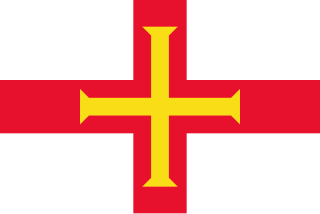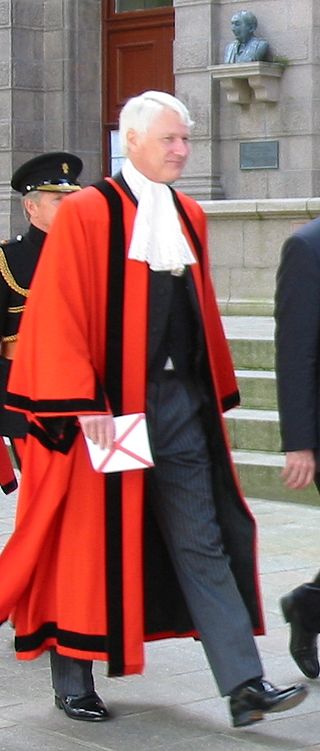Related Research Articles

The Channel Islands are an archipelago in the English Channel, off the French coast of Normandy. They include two Crown Dependencies: the Bailiwick of Jersey, which is the largest of the islands; and the Bailiwick of Guernsey, consisting of Guernsey, Alderney, Sark, Herm and some smaller islands. They are considered the remnants of the Duchy of Normandy and, although they are not part of the United Kingdom, the UK is responsible for the defence and international relations of the islands. The Crown dependencies are not members of the Commonwealth of Nations, nor have they ever been in the European Union. They have a total population of about 171,916, and the bailiwicks' capitals, Saint Helier and Saint Peter Port, have populations of 33,500 and 18,207, respectively.

Guernsey is an island in the English Channel off the coast of Normandy that is part of the Bailiwick of Guernsey, a British Crown Dependency.

Politics of Guernsey take place in a framework of a parliamentary representative democratic British Crown dependency.

Alderney is the northernmost of the inhabited Channel Islands. It is part of the Bailiwick of Guernsey, a British Crown dependency. It is 3 miles (5 km) long and 1+1⁄2 miles (2.4 km) wide.

The Crown Dependencies are three island territories in the British Islands that are self-governing possessions of the British Crown: the Bailiwick of Guernsey, the Bailiwick of Jersey, and the Isle of Man. They are not part of the United Kingdom (UK) nor are they British Overseas Territories. They have the status of "territories for which the United Kingdom is responsible", rather than sovereign states. As a result, they are not member states of the Commonwealth of Nations. However, they do have relationships with the Commonwealth and other international organisations, and are members of the British–Irish Council. They have their own teams in the Commonwealth Games.
The bailiff is the chief justice in each of the Channel Island bailiwicks of Guernsey and Jersey, also serving as president of the legislature and having ceremonial and executive functions. Each bailiwick has possessed its own bailiff since the islands were divided into two jurisdictions in the 13th century. The bailiffs and deputy bailiffs are appointed by the Crown on the advice of the Secretary of State for Justice and may hold office until retirement age.

The Bailiwick of Guernsey is an island country off the coast of France as one of the three Crown Dependencies.

The title Bailiff of Guernsey has been used since at least the 13th century and indicated the leading citizen of Guernsey.

The Bailiff of Jersey is the civic head of the Bailiwick of Jersey. In this role, he is not the head of government nor the head of state, but the chief justice of Jersey and presiding officer of Jersey's parliament, the States Assembly. The Bailiff is also the President of the Royal Court. It is similar in role to the Bailiff of Guernsey.

Guernsey elects a legislature at the national level. The islands of Alderney and Sark also elect their own parliaments.
The jurats are lay people in Guernsey and Jersey who act as judges of fact rather than law, though they preside over land conveyances and liquor licensing. In Alderney, however, the jurats are judges of both fact and law in both civil and criminal matters.

The States of Guernsey, officially the States of Deliberation and sometimes referred to as the Government of Guernsey, is the parliament and government of the British Crown dependency of Guernsey. Some laws and ordinances approved by the States of Guernsey also apply to Alderney and Sark as "Bailiwick-wide legislation" with the consent of the governments of those islands. All enactments of the States of Guernsey apply to Herm as well as Guernsey, since Herm is directly administered by the Bailiwick of Guernsey.

The Lieutenant Governor of Guernsey is the representative of the British monarch in the Bailiwick of Guernsey, a Crown dependency of the British Crown. The role of the Lieutenant Governor is to act as the de facto head of state in Guernsey and as liaison between the governments of Guernsey and the United Kingdom. The holder of this office is also ex officio a member of the States of Guernsey but may not vote and, by convention, speaks in the Chamber only on appointment and on departure from post. The duties are primarily diplomatic and ceremonial. He has the authority to appointment two members of the board of governors of Elizabeth College and the Priaulx Library.

The States of Alderney is the parliament/council and the legislature of Alderney, part of the Bailiwick of Guernsey. The origin of the States is unknown, but has operated from the medieval period. The States of Alderney comprises ten Members, and a President of the States of Alderney, currently William Tate who was elected in 2019 and re-elected in 2020.

The Leader of Alderney is the civil leader of Alderney. Alderney is a dependency of the Bailiwick of Guernsey. Its leader has traditionally been appointed by the British Crown and has been known by various titles including Lord of Alderney, Governor of Alderney, and the current President of the States of Alderney. The President of the States of Alderney is directly elected every four years and there is no constitutional limit to the number of terms served. The current president, William Tate has held the post since 2019.

Politics of Alderney takes place in a framework of a parliamentary representative democratic British Crown dependency, whereby the President of the States of Alderney is the head of government. Alderney is part of the Bailiwick of Guernsey but is largely self-governing.

The President of the States of Alderney, also known as the President of Alderney, is the elected head of Alderney's legislature, the States of Alderney and the Leader of Alderney. The Presidency is the latest of a variety of political positions to govern the island. The office was established in 1949 after a new constitution establishing Alderney as a subordinate part of the Bailiwick of Guernsey.

The judiciary of Jersey is a branch of the government of Jersey that interprets and applies the laws of Jersey, to ensure equal justice under law, and to provide a mechanism for dispute resolution. The Bailiff of Jersey is the President of the Royal Court. Individual trials are heard by the Bailiff, the Deputy Bailiff or a Commissioner. The Master of the Royal Court deals with some preliminary matters in civil cases. The Court is supported by the Judicial Greffier who acts as the registrar. In addition to the judge, the Royal Court includes a number of volunteer Jurats. The Jurats decide issues of fact in criminal and civil trials, hand down sentences in criminal trials and award damages in civil trials. All judges in Jersey are bound by a code of conduct, introduced in 2007, which requires them to "uphold the integrity and independence of the judiciary and perform their duties with competence, diligence and dedication".

The Courts of Guernsey are responsible for the administration of justice in the Bailiwick of Guernsey, one of the Channel Islands. They apply the law of the Island, which is a mixture of customary law dating back as far as the 10th century and legislation passed by the legislature, the States of Deliberation.

The Law of Guernsey originates in Norman Customary Law, overlaid with principles taken from English common law and [French law], as well as from statute law enacted by the competent legislature(s) -- usually, but not always, the States of Guernsey
References
- 1 2 "Oxford Constitutions of the World: Alderney: Introductory Note". Oxcon.ouplaw.com. 25 March 1957. Retrieved 15 February 2014.(registration required)
- 1 2 3 Ben Cahoon. "Alderney". Worldstatesmen.org. Retrieved 15 February 2014.
- ↑ "Indictable Offences Act Amendment Act 1868". Legislation. Retrieved 15 February 2014.
- ↑ "How does the 1948 agreement join Guernsey and Alderney?". BBC News. 20 August 2010. Retrieved 15 February 2014.